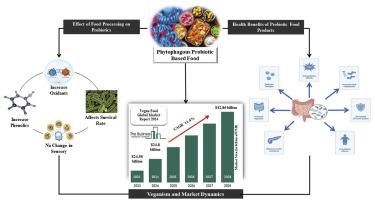Phytophagous probiotic foods: Exploring the intersection of characteristics, quality implications, health benefits, and market dynamics
IF 15.1
1区 农林科学
Q1 FOOD SCIENCE & TECHNOLOGY
引用次数: 0
Abstract
Background
The development of novel food products with functional properties, particularly those that contain bioactive substances and probiotic microorganisms, is driving the rising demand for improved nutritional content. Phytophagous probiotic products assume significance in this manner. These are commonly known as biotechnological formulations comprising beneficial microorganisms with a primary nutritional preference for plant matter consumption. These beneficial microorganisms have been commonly utilized in non-dairy products due to their diverse and significant characteristics, which can influence not only food quality and safety parameters but also various aspects of human health.
Scope and approach
This present study has conducted an assessment of phytophagous probiotic products, providing a thorough examination of both commercially accessible and scientifically investigated products, along with their associated health-promoting advantages.
Key findings and conclusions
The information presented in this article will be of great value to researchers and professionals in the industry, as it will help guide future research efforts that should focus on investigating key factors related to vegan food. These factors include consumer preferences, with the ultimate goal of promoting widespread global adoption of veganism. Moving forward, it is recommended that short-term marketing strategies incorporate not only the vegan demographic but also individuals who aim to reduce their consumption of animal-derived products while actively seeking innovative non-animal-derived alternatives.

植食性益生菌食品:探索特征、质量影响、健康益处和市场动态的交叉点
背景开发具有功能特性的新型食品,特别是含有生物活性物质和益生微生物的食品,正在推动对营养成分改善的需求不断增长。在这方面,植食性益生菌产品具有重要意义。植物性益生菌产品通常被称为生物技术制剂,由有益微生物组成,主要营养成分偏向于植物性物质。本研究对植物性益生菌产品进行了评估,对商业上可获得的和科学上已研究过的产品及其相关的促进健康的优势进行了全面检查。主要发现和结论本文提供的信息对行业内的研究人员和专业人士具有重要价值,因为它有助于指导未来的研究工作,这些研究工作应侧重于调查与素食食品有关的关键因素。这些因素包括消费者的偏好,最终目标是促进全球广泛采用素食主义。展望未来,建议短期营销战略不仅要将素食人群纳入其中,还要将那些旨在减少动物源性产品消费,同时积极寻求创新的非动物源性替代品的人纳入其中。
本文章由计算机程序翻译,如有差异,请以英文原文为准。
求助全文
约1分钟内获得全文
求助全文
来源期刊

Trends in Food Science & Technology
工程技术-食品科技
CiteScore
32.50
自引率
2.60%
发文量
322
审稿时长
37 days
期刊介绍:
Trends in Food Science & Technology is a prestigious international journal that specializes in peer-reviewed articles covering the latest advancements in technology, food science, and human nutrition. It serves as a bridge between specialized primary journals and general trade magazines, providing readable and scientifically rigorous reviews and commentaries on current research developments and their potential applications in the food industry.
Unlike traditional journals, Trends in Food Science & Technology does not publish original research papers. Instead, it focuses on critical and comprehensive reviews to offer valuable insights for professionals in the field. By bringing together cutting-edge research and industry applications, this journal plays a vital role in disseminating knowledge and facilitating advancements in the food science and technology sector.
 求助内容:
求助内容: 应助结果提醒方式:
应助结果提醒方式:


